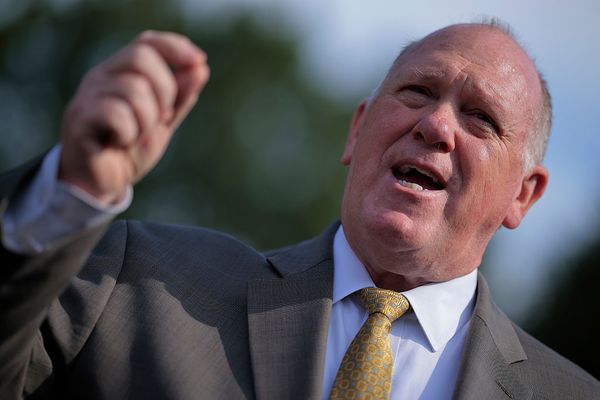
“For God’s sake, this man cannot remain in power,” said US President Joe Biden in Warsaw, referring to Russian leader Vladimir Putin. History tells us what America means when it says words like that out loud. Just ask any of the sovereign heads of state who they’ve tried to kill: Congo’s Lumumba, Dominican Republic’s Trujillo, Vietnam’s Ngo, Cuba’s Castro, Libya’s Gaddafi, to name a few.
The US has a long track record of extrajudicial assassination of its perceived enemies, including Osama bin Laden, ISIS leader Abu Bakr al-Baghdadi and Iranian military chief General Qassem Suleimani.
Assume Biden wasn’t kidding. If Putin was taken out in the interests of, well, humanity, would that be okay?
Doing so would not be justified as a lawful military action in the context of war, even if the Ukrainians did it.
It is well recognised within the rules of war that killing military commanders is legitimate; reportedly Ukraine has been targeting Russia’s generals and has managed to kill seven of them already.
If Putin was the commander-in-chief of Russia’s armed forces, as the US President is of America’s or (hilariously) the Queen is of ours, then there’d be an arguable basis for targeting him. Technically, however, he is not.
There is also the problem of whether there is a war at all. Russia has not declared war on Ukraine, insisting it is engaged in a “special military operation” described by Putin as peacekeeping, in line with a long tradition of Russian-style peacekeeping dating back to Ivan the Terrible. Ukraine has not declared war either, but it is unmistakably at war.
The US and NATO are not at war with Russia, and they’re trying to keep it that way. Killing Putin may be a measure they decide is necessary to prevent World War III, but there is no legal precedent for preventative assassination as a justified expedient to preserve peace.
The murder of Suleimani, by US drone strike in 2020, provides an interesting precedent. Suleimani was head of Iran’s Quds Force, which the US had designated a foreign terrorist organisation on the basis that it was instrumental in pursuing Iran’s policies of supporting terrorist groups in Syria and Iraq.
The US justified Suleimani’s assassination on the basis that it was necessary to deter future plans for attacks on US military and diplomatic personnel. “The United States will continue to take all necessary action to protect our people and our interests wherever they are around the world.”
This is a fundamental policy position the US has held more or less since its creation: reservation of the absolute right to project its force anywhere in the world to protect its interests as it sees fit. Since 9/11, this has been only faintly tethered to any theoretical respect for the rule of law, international or domestic.
In truth, the killing of Suleimani, as with bin Laden, was purely an extrajudicial murder for which no real legal justification can be found. It was an act of war against a country with which the US was not at war. With bin Laden, it was the execution of a non-state actor as an act of revenge. The moral case is not difficult to see, assuming you subscribe to Old Testament principles, but there was no legal case.
Under international law, it is illegal to assassinate a head of state. The earliest rules of war devised in the 19th century singled out heads of state for protection, understandable since they were the ones making the rules, and war was seen as a natural state.
The idea has stuck, and is now enshrined in a 1973 UN convention that explicitly includes heads of state in the definition of “internationally protected persons” and requires its signatories to make any attempt on such a person’s life a crime. The US has done so.
Is it that simple? Of course not. There are arguable loopholes. One is Article 51 of the UN Charter, which reserves the right of all nations to “the inherent right of individual or collective self-defence if an armed attack occurs against a member of the United Nations”. This is the ostensible basis for the US practice of extrajudicial assassination, and some lawyers say it could be used to override the prohibition on taking out a foreign head of state as an action in self-defence.
Putting the law to one side, since it’s a mess, how strong is the moral case? Abraham Lincoln argued, as Plato did, that assassinating a leader may be justified when their people have suffered for an extended period of time and all legal and peaceful means of removal have been exhausted. That is, when there is no other choice — the Pol Pot or Idi Amin defence. That’s what the US also argued to morally justify the removal of Saddam Hussein from power via its illegal invasion of Iraq.
A tyrant who attained power by legitimate means loses, by his tyranny, his moral authority to remain in power, since power does come with responsibility. His subjects are justified then in removing him, including violently if that’s what it takes.
As to whether that domestic cause can lawfully call on the support of external nations is a different and far more problematic question. The US would always say yes, of course, but only if doing so suits America’s national interest. At that point, law and morality both part company with the pragmatism of national self-interest, and self-interest is the true arbiter of international relations.
Meaning, for Putin, watch your back. When you wave the nukes around, remember that America has no sense of humour and a very long reach.







